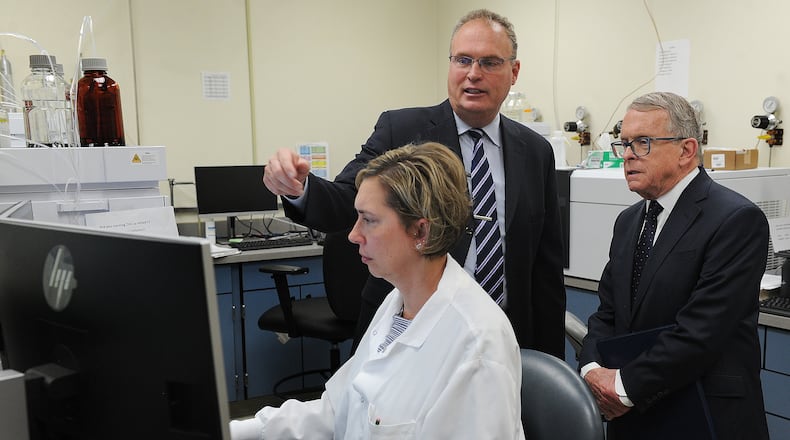Harshbarger said he took the job to help the Franklin County Coroner’s Office rebuild from a critical staffing shortage, and he took measures to mitigate ethical concerns. This includes taking a pay cut and reducing his workload in Montgomery County and recusing himself from anything having to do with negotiating the contract between the two counties he works for.
Harshbarger notified Montgomery County commissioners in January that he was engaging in the private practice of medicine. Ohio law allows coroners of large counties to take “full-time” pay if they don’t have a practice on the side or a reduced “part-time” pay if they do.
“I still sign all the death certificates. I still do all the supervision required. I am there less, but the office is functioning,” he said.
The pay cut lowers his Montgomery County compensation to $89,709 this year. He was paid $219,862 last year, which made him the county’s second-highest-paid employee.
Harshbarger received the job offer from Franklin County in March and started the job in May making $325,000 a year working 30 hours a week. His title is deputy coroner/forensic pathologist. Harshbarger is a licensed forensic pathologist.
Harshbarger said the job was a “good opportunity,” but he mainly went to Franklin County to help it deal with a staff exodus that left him as the only staff forensic pathologist there when he started amid a surge of deaths needing autopsies.
“I’m just trying to help the families of Franklin County,” he said.
The office of Franklin County Coroner Anahi Ortiz would not answer questions about Harshbarger’s employment, what caused their staff to leave or what they are doing about it.
New contract
Montgomery County finalized a new agreement with the Franklin County Coroner’s Office in March. Franklin County will pay Montgomery County up to $320,000 through December for coroner services.
Harshbarger said this was another effort to help Franklin County deal with its staff shortage.
“Franklin County needed a place to send their autopsies to,” he said. “I had nothing to do with the contract and how it was signed or the terms.”
He said he recused himself entirely from negotiating that contract after consulting with Montgomery County commissioners and their attorneys and delegated the process to his office director, Brooke Ehlers. Ehlers is the signatory on the contract for Montgomery County.
Franklin County has paid Montgomery County $50,896 through June, according to records obtained using public records law.
Harshbarger said Franklin County stopped sending cases to Montgomery County because of questions about potential conflict. Most Franklin County cases now go to Hamilton County.
‘Raises issues under ethics law’
Ohio ethics law bans public officials from contracting with their outside employers. The Dayton Daily News last year reported that several elected county coroners work for other counties with which their offices contract.
Warren County Coroner Russell Uptegrove works for the Hamilton County coroners’ office, where Warren County sends many of its autopsies. Clark County Coroner Susan Brown is Montgomery County’s highest-paid employee, earning $230,995 last year as a forensic pathologist, and Clark County sends all of its autopsies to Montgomery County.
“It raises issues under the ethics law,” Ohio Ethics Commission Director Paul Nick said of the practice of county coroners taking jobs with other counties with which their office has contracts.
Ohio law allows government entities to obtain an opinion from the Ethics Commission before taking an action to get an official ruling on whether it is in line with state ethics law. No one has obtained an advisory opinion on the practice from the ethics commission.
After the newspaper’s story published last year, both Hamilton County and Uptegrove separately reached out to the Ethics Commission for guidance in November. The Ethics Commission provided a fact sheet and previous opinions related to public contracting but said the requesters would have to seek a formal opinion if they wanted the commission to weigh in on the specifics in their situation.
Ethics Commission officials also noted that they can’t provide an opinion on actions that have already been taken.
“We all want to follow the rules, just we can’t get the rule defined,” Harshbarger said.
Other contracts
Brown said she provided input in the most recent contract negotiations between Clark and Montgomery counties based on her experience as a forensic pathologist, but the contract was negotiated and signed by Clark County commissioners.
She said Montgomery County offered the best deal and was closer for funeral homes and families of the deceased than other counties. Clark County doesn’t have the facilities to do its own autopsies.
Prior to the agreement between Franklin and Montgomery counties signed in March, Montgomery County did occasional work for Franklin County. Franklin County paid Montgomery County $1,600 for one autopsy in 2021 and $3,200 for two autopsies in 2020, according to financial records obtained from Franklin County.
Harshbarger also previously worked for Franklin County on a more limited part-time basis.
Harshbarger said he now does fewer autopsies in Montgomery County but has enough staff to handle the workload. Once Franklin County is stabilized, he intends to return to working full-time in Montgomery County.
He said Montgomery County currently has the staff to handle increased caseloads here. But the market is increasingly competitive, forcing high turnover as agencies poach staff from each other. He said this situation underlines a national shortage of forensic pathologists that risks becoming a crisis as the number of needed autopsies here and elsewhere spike in the wake of the pandemic.
About the Author

